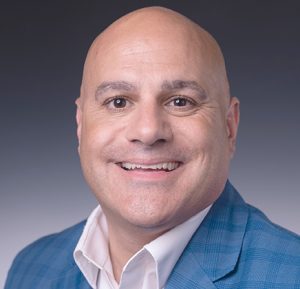 ALTMAR — Thomas J. Fernandez is passionate about fly fishing. Fortunately, one of America’s premier venues for the sport is the Salmon River, located in Oswego County on the east end of Lake Ontario, a short 40-minute drive from Syracuse.
ALTMAR — Thomas J. Fernandez is passionate about fly fishing. Fortunately, one of America’s premier venues for the sport is the Salmon River, located in Oswego County on the east end of Lake Ontario, a short 40-minute drive from Syracuse.
While fishing early this year on the river, Fernandez saw a “For Sale” sign in front of the former Altmar Elementary School that had been closed. Thus begins the story of Tailwater Lodge.
Fernandez is director of business development at the Woodbine Group, a Syracuse–based development and management company that invests in commercial real estate, warehousing, and hospitality. Where most people simply saw a school, he saw an opportunity to convert the facility into a first-class venue where those who shared his passion could literally exit the building, and fish on 1,700 feet of private riverfront abounding in trophy-size salmon and trout. Fernandez brought his vision to Norman E. Swanson, president and owner of Woodbine.
(Sponsored)

Ask the Expert: Investing in the Future with Registered Apprenticeship
In today’s competitive job market, finding and retaining top talent can be incredibly challenging. For companies, Registered Apprenticeship is an investment not only in its employees but in its future.

Year-End Benefits Check: Is Your Team Getting the BOOST They Deserve for 2026?
As we close out 2025 and finalize employee benefits for the coming year, there’s one question every small to medium-sized business owner should ask: Are your employees truly understanding—and maximizing—the
Swanson, who began investing in the hospitality industry in Syracuse in 1984, quickly recognized the opportunity. Many who fish on the Salmon River prefer fly-fishing, a sport whose practitioners reflect extraordinary demographic numbers. The audience tends to be male (80 percent), 45 years of age on average, and falls into the $100,000-plus income bracket. They readily spend thousands of dollars on rods, reels, accessories, clothing, and travel and lodging. Fly fishermen typically pursue the sport about 17 days annually, and 20 percent of the 6 million Americans who fly fish live within a six-hour drive of the river. (These figures exclude the Canadians and overseas visitors who also fish on the Salmon River).
Fly fishermen represent only a sub-set of anglers who line the Salmon River’s banks, mostly along a 12- to 13-mile stretch that is fishable to the river’s fish hatchery. (Above the dam is an area designated only for fly fishing.) According to the latest Creel Report released by the New York State Department of Environmental Conservation, 68 percent of all angler-hours on Lake Ontario’s tributaries were spent just on the Salmon River. The majority of catches of Chinook and Coho salmon were also recorded on the Salmon, and the steelhead (trout) catch has more than quadrupled in recent years.
Sealing the deal
“We put in an offer on the property by April,” says Robert Kelsey, Woodbine’s controller. “The purchase price for the 42,000-square-foot building and 35 acres was $410,000. I estimate that the acquisition and build-out will cost approximately $5 million. The company did receive a partial deferral of real-estate-tax payments over 10 years as well as an exemption from sales tax on construction materials and no mortgage-recording tax fee. The seller was the Altmar-Parish-Williamstown Central School District, whose listing broker was George Lee of the Pyramid Brokerage Co. Woodbine was represented by Michael Kalet, also of Pyramid.”
Fernandez says that “Even though the facility was constructed in 1929, the building was in great shape. It had a new roof, the windows and doors didn’t need replacement, and it was well-maintained. The architect basically split the classrooms in half to create 42 bedrooms — 33 doubles and nine singles. He converted the gym into a restaurant, bar, conference area, and pro shop called the ‘Woodshed.’ We anticipate hiring a staff of 12, relying on Woodbine’s marketing department and back office to support some of Tailwater’s operations. (The name refers to that portion of a river located below a dam.) Nick Miller, who will serve as the resort manager, has already moved to Altmar from the Genesee Grande [Hotel].”
The unique Salmon River
Tailwater is positioned on a unique waterway. “There isn’t another river system like it,” posits Francis J. Verdoliva, the special assistant for the Salmon River Fish Hatchery located in Altmar. “The river starts in the Tug Hill Plateau and is fed by Adirondack streams that are cold all year long. It’s a pristine region that is heavily forested and has few residents.” (The greater Tug Hill region contains 4,000 miles of rivers and streams, 117,000 acres of wetlands, and 121,000 acres of forest land owned by the state. The region annually receives 42 to 50 inches of precipitation, half delivered by lake-effect.)
“This hatchery breeds more than 3 million yearlings annually: 1.8 million Chinook; 250,000 Coho; 900,000 steelhead; and 400,000 brown trout,” continues Verdoliva. “We have controlled the sea lamprey and alewife populations in the lake [Ontario] so the fish grow to trophy size, and the dams on the river guarantee a steady flow [of water] all year. Mother Nature may hold all the cards, but we have held the [fish] population steady for years, despite increasing pressure from the growing number of fishermen and the fact that they now fish year-round … I wonder whether anybody stays home anymore.”
The popularity of the region as a fishing paradise is echoed by David Turner, the director of community development, tourism, and planning for Oswego County. “One-third of all tourism dollars in the county come from this industry. According to our latest figures, the ‘angler impact’ is $42.6 million a year, which includes lodging, meals, gas, equipment, salaries, marina rentals, and bait-shop purchases. Anglers from every state in the U.S. and many countries around the world purchase in excess of 30,000 non-resident licenses every year, more than any other county [in the state].”
Troy Creasy, the owner of High Adventure Sportfishing, echoes Verdoliva’s and Turner’s comments about the bountifulness and popularity of the Salmon River. “The fish are doing well,” says Creasy. “The numbers are way up over the last 20 years, and they are easy to catch. The population is stable thanks [both] to the stocking program and to natural reproduction. I see fly fishing definitely growing on the river and more women and families are enjoying … [the sport]. I’m also glad to see younger people going after salmon and steelhead. It seems to be the in-thing to do. What’s [especially] interesting is that more guys are carrying two rods rather than one — a fly-fishing rod and a spinning rod … This place has an international reputation; it’s a world-class fishery. I just had a party from South Africa who came here to fish for steelhead.”
Shane Broadwell, a partner in the Broadwell Hospitality Group with multiple hotels, restaurants, and a new convention center on the Oswego River, says that “… fishing is a huge attraction for our county. We’re not forecasting a downturn, because the Salmon River is recognized for the size and weight of the fish. The guides and captains are busy all year, many going from their charter boats in the spring and summer to drift boats in the fall and winter. The [Salmon] river is busy every day. There is a steady demand for new accommodations.”
Marketing Tailwater
Woodbine began marketing the new lodge long before it was completed, attending area association meetings. The marketing department is also gearing up to attend fly-fishing trade shows, such as the International Fly Tackle Dealer Show scheduled for Orlando in July 2014, as well as reaching out to travel agencies with visitor packages. In addition to fishing devotees, Tailwater is promoting to area corporations in need of a venue for business and sales meetings and to area residents looking for a venue for a celebratory event. Also, Woodbine representatives are meeting with local vendors, such as charter captains and the Lobdells of Pulaski who are attracting visitors to the region with the newly re-opened Kallet Theater. “We are pricing a night at the lodge in the $150 to $180 range,” says Fernandez. “[Tailwater] is looking for overnight stays as well as lodging by the week and longer. We know that the primary draw is within a seven-hour drive of the facility, so that is where we will do most of our target-marketing.”
Fernandez emphasizes “… that we are focused on promoting the Tailwater brand as a total experience. This includes a pro shop where we sell custom rods made by JP Ross [Fly Rods & Co.] and custom fishing line from Cortland Line, both with our own brand. I met with JP, and we worked out the specs together.”
“We call the new rods ‘Blue Steel,’” says Jordan Peter Ross, 37, a native of Whitesboro. “They are made of fiberglass and are unique to the [fly-fishing] industry. The rods will be available for purchase at the [on-site] store and online … Blue Steel is designed specifically for Great Lakes tributary fishing. The [JP] rods will be priced in a $400 to $700 range, but we will also carry rods at $200. In addition to making rods, I’m working with Tom [Fernandez] on the retail marketing of the store, which will also carry pottery, cutting boards, mugs, pots, leather coasters, and other items that will appeal to a fly-fishing [audience].” The website was created by Rounded Development of Syracuse.
Ross continues, “We need to be agile as the seasons change. We need to be responsive to the changes [in the industry] where more women and families with young children are now fishing, and we need to think strategically. There are plenty of native brook trout [upstream] in the tributaries, which offers another opportunity to attract [anglers]. I have seen double-digit sales growth in the high end of the fly-fishing market as I sell more [not just domestically] … but also internationally, especially in England, France, New Zealand, and Japan.”
Woodbine was founded by Swanson in 1978. The company now employs more than 150 people and includes 1.8 million square feet of property. The Business Journal estimates that Woodbine generates $30 million in annual revenue. Swanson is a 1965 graduate of Syracuse University and a life-long resident of Syracuse. His business focus has been to buy vacant, distressed properties and rehabilitate them. His entry into the hospitality industry began in 1984 with the purchase of the Mohawk Manor, now renamed the Genesee Grande Hotel. Subsequent acquisitions and developments include the adjacent Mayflower, the Parkview Hotel (originally the Medical Arts Building), and the Hotel Skyler (originally Temple Adath Yeshurun.) Tailwater represents the fifth hospitality project in the Woodbine portfolio.
It has been 363 years since French explorers first translated the Iroquois word for the Salmon River (Hehhah-wa-gah11). The area continues to attract anglers, who increasingly come to catch and release their quarry, the “sweet fish.” Tailwater is well situated to cater to this avid, prosperous demographic, as well as to offer a celebratory venue to local corporations and residents.
Tailwater may be a fish story, but there is nothing fishy about the venture. The lodge officially opens in late December.
Contact Poltenson at npoltenson@cnybj.com



